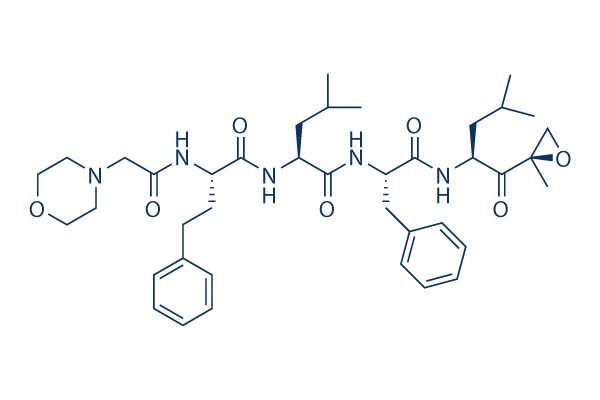Carfilzomib (PR-171) is an irreversible proteasome inhibitor with IC50 of <5 nM in ANBL-6 cells, displayed preferential in vitro inhibitory potency against the ChT-L activity in the β5 subunit, but little or no effect on the PGPH and T-L activities.
Carfilzomib inhibits proliferation in a variety of cell lines and patient-derived neoplastic cells, including multiple myeloma, and induced intrinsic and extrinsic apoptotic signaling pathways and activation of c-Jun-N-terminal kinase (JNK). Carfilzomib reveals enhanced anti-MM activity compared with bortezomib, overcome resistance to bortezomib and other agents, and acts synergistically with dexamethasone (Dex). Carfilzomib shoes preferential in vitro inhibitory potency against the ChT-L activity in the β5 subunit, with over 80% inhibition at doses of 10 nM. Short exposure to low-dose Carfilzomib leads to preferential binding specificity for the β5 constitutive 20S proteasome and the β5i immunoproteasome subunits. Measurement of caspase activity in ANBL-6 cells pulsed with Carfilzomib reveals substantial increases in caspase-8, caspase-9, and caspase-3 activity after 8 hours, giving a 3.2-, 3.9- and 6.9-fold increase, respectively, over control cells after 8 hours. In carfilzomib pulse-treated cells, the mitochondrial membrane integrity is decreased to 41% (Q1 + Q2), compared with 75% in vehicle-treated control cells. [1] In another study, Carfilzomib has also shown preclinical effectiveness against hematological and solid malignancies. [2] Carfilzomib directly inhibits osteoclasts formation and bone resorption. [3]
Products for scientific research use only







